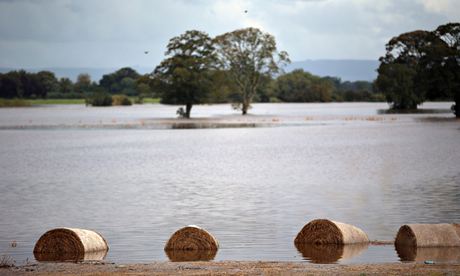Britain can expect more droughts, heatwaves, storms surges and floods from climate change but may be most impacted by climate shocks in other countries, according to leading business analysts responding to UN climate science report released on Monday.
With nearly 40% of all UK food imported to feed a population of about 63m and overseas assets worth trillions of dollars, the UK is particularly exposed to climate change, says Celine Herweijer, a member of the climate change team at PWC.
"The treats from climate change overseas appear an order of magnitude higher than domestic threats. The pattern emerging with food supplies is that when a weather disaster strikes a country it holds on to the food it grows," said Herweijer. "In 2008, 25 developoing countries banned exports or increased their export taxes because of climate emergencies at home. In 2011, Russia banned food exports for a time during a heatwave. Countries protect their own food supplies in an emergency," she said.
Britain is also vulnerable because its population is expected to add more than 10m people in the next 40 years, putting added strains on farmers and supermarkets, she said. Imported foods that are particularly vulerable to climate change abroad include fruit like bananas, staple crops like wheat and commodities like cocoa. Much animal feed is also imported which suggests that the price of meat could rise if harvests are hit elsewhere.
"Climate change overseas could have impacts on the UK, greater than that from climate change at home. It's the quantity of food that we need which is the problem. We can expect the price of meat to go up. We might have to change our diets," she said.
PwC analysis for Department for Environment, Food and Rural Affairs warned last year that with the UK holding £10tn of assets abroad, physical damage of even a very small proportion of these assets can be significant. "Global risks in food security will translate to UK risks in food security, as food supplies in the UK are underpinned by global food supplies. Current main threats are fluctuating and volatile prices as a result of disruptions in the production, transportation and distribution of imported foodstuffs; but future threats could be more systemic if availability of core foodstuff becomes threatened," said PwC.
The government's own analysis of the impacts of climate change in Britain suggests that climate change could increase the costs of flooding to £10bn a year by 2080, as well as cause more deaths from heatwaves, and large-scale water shortages.
Over 700 UK impacts from rising temperatures were identified, including the possibility of "climate refugees" arriving from wars over dwindling water and food, threats to forests from new exotic diseases, and water shortages.
While the IPCC report does not single out impacts for Britain, it says Europe as a whole can expect further economic costs from flooding and extreme heat.
Over 1m homes in Britain are presently at risk of flooding, the Environment Agency has calculated. This includes surface water flooding which happens when rainwater cannot drain away, river flooding when a river cannot cope with the amount of water draining into it, and sea water flooding which happens with high tides.
• This article was amended on 31 March to correct the population of the UK

